Artificial intelligence (AI) is having a significant impact on cybersecurity, with both positive and negative consequences for both attackers and defenders. Cybercriminals are utilizing AI to carry out more advanced and diverse attacks on a larger scale, while cybersecurity teams are employing the same technology to safeguard their systems and data.
Dr. Brian Anderson, a chief digital health physician at MITRE, will be speaking at the HIMSS 2023 Healthcare Cybersecurity Forum on the panel titled “Artificial Intelligence: Cybersecurity’s Friend or Foe?” alongside other industry experts. Anderson was interviewed in advance of his September 7th HIMSS remarks. The following is a summary of what he said
AI presents concerns in terms of enabling denial of service attacks, brute force attacks, model poisoning, and the potential for prompt engineering approaches to write malicious code. However, AI can also benefit hospitals and health systems by aiding in threat identification, malware detection, and predicting phishing attacks. Generative models can help in flagging harmful bots and mitigating insider threats. ChatGPT and similar generative AI models introduce cybersecurity risks by enabling the writing of nefarious code and the potential for social engineering, misinformation, and impersonation. Despite the risks, Anderson believes that with appropriate safeguards in place, the positive potential of AI in healthcare outweighs the negatives. It is essential to identify and address vulnerabilities and risks promptly, given the criticality of healthcare and patient safety.
The whytry.ai article you just read is a brief synopsis; the original article can be found here: Read the Full Article…





